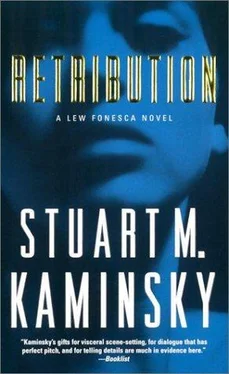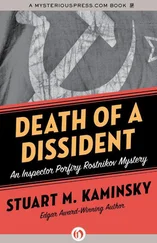Stuart Kaminsky - Retribution
Здесь есть возможность читать онлайн «Stuart Kaminsky - Retribution» весь текст электронной книги совершенно бесплатно (целиком полную версию без сокращений). В некоторых случаях можно слушать аудио, скачать через торрент в формате fb2 и присутствует краткое содержание. Жанр: Криминальный детектив, на английском языке. Описание произведения, (предисловие) а так же отзывы посетителей доступны на портале библиотеки ЛибКат.
- Название:Retribution
- Автор:
- Жанр:
- Год:неизвестен
- ISBN:нет данных
- Рейтинг книги:4 / 5. Голосов: 1
-
Избранное:Добавить в избранное
- Отзывы:
-
Ваша оценка:
- 80
- 1
- 2
- 3
- 4
- 5
Retribution: краткое содержание, описание и аннотация
Предлагаем к чтению аннотацию, описание, краткое содержание или предисловие (зависит от того, что написал сам автор книги «Retribution»). Если вы не нашли необходимую информацию о книге — напишите в комментариях, мы постараемся отыскать её.
Retribution — читать онлайн бесплатно полную книгу (весь текст) целиком
Ниже представлен текст книги, разбитый по страницам. Система сохранения места последней прочитанной страницы, позволяет с удобством читать онлайн бесплатно книгу «Retribution», без необходимости каждый раз заново искать на чём Вы остановились. Поставьте закладку, и сможете в любой момент перейти на страницу, на которой закончили чтение.
Интервал:
Закладка:
And with that Merrymen staggered out of the door. I looked out of my window and our eyes met. This was not a friendly departure.
“I have an appointment,” I said.
“I’ll take care of him,” said Ames. “You want him here when you get back?”
“Yes,” I said.
“I’ll get him one of those things you drink from the Dairy Queen and some ice for his face,” Ames said.
“I’ll be back soon. By the way, what made you arrive just in time for the rescue?”
He reached into his pocket and pulled out the morning’s Sarasota Herald-Tribune. It was folded so that I could see the small article and the photograph at the bottom. The headline over the photograph read: “Murder Attempt on Motorist.” There was a picture of me inset in the small article. The picture was the same one I had taken for my process server’s license. I looked like a cockeyed smirking chimp, the very prey any sensible hunter looking for an easy target might take a shot at.
“Thought you might need help,” said Ames.
“You were right,” I said. “I’ll get back as soon as I can.”
Ann Horowitz was on the telephone when I arrived. She looked at me over the top of her glasses and motioned for me to close the door and take my usual seat. I did.
“Listen,” she told her caller, “my next client just came in. But I’ll give you advice. You called to sell me insurance on dying people. It’s an interesting idea. I give you money and then wait till my person dies. I check the obituaries or wait for you to call saying, ‘Good news, Emily Jacobs just died.’ Sensible but an aura of morbidity that I find strange. My question is, ‘How do you feel about selling the death?’… The word ‘fine’ came too suddenly to your lips as if you wanted to leap over some chasm and come out on the other side with a smile. What if I took my insurance out on your life? Don’t answer. You’ve been doing this how long? Six months. And you are making money as you promise I will. I have a question for you to consider, but I haven’t time now to hear your answer. The question is, what do you think is the meaning of your life? Answer it and then call yourself a liar and tell the liar to tell the truth. You have my number. If you want to make an appointment to see me to talk over your answer, call. My charge is one hundred dollars a session. Now, good-bye.”
She hung up the phone and settled back.
“No offering?” she asked, looking at my empty hands. “No biscotti, no scone, no rugelach, not even a donut?”
“I didn’t have time,” I said. “I was dealing with a lunatic in my office who was trying to kill me.”
“He didn’t succeed,” she said calmly. “I’ve got some raisins in the drawer.”
“No thanks.”
“We can drink my coffee,” she said.
“No thanks,” I said.
I had twice tried Ann’s coffee. It was thick, bitter, and I never saw her drink it.
“Why did this man want to kill you?” she asked.
“Because he’s crazy. He thinks everyone is trying to… he’s paranoid. Nuts. A loony. He beat up his son in my office.”
“Your clients sound almost as interesting as mine,” she said, opening a nearby drawer and pulling out a clear, small Ziploc bag of raisins that she opened and began to eat.
“We’ll compare notes sometime,” I said.
“Now is a good time,” Ann answered, looking up at her wall clock. “We still have forty-five minutes. So, I’ll start with a question. Why does a hermetic, depressed recluse have any clients at all outside of those for whom he serves papers?”
“I don’t know,” I said.
“Common denominator,” she asked.
I’d heard that phrase before today. It had more than a hint of deja vu.
“People come to me,” I said. “I don’t ask for them. I don’t want them.”
“But you don’t turn them down,” she said, nibbling a raisin. “Why? You’ve described some of your clients in past sessions. I see a common denominator. I may be wrong but it’s a place to start.”
“What is it?” I asked.
“They all remind you of the most important person in your life,” she said.
“Who?”
“You, Lewis Fonesca. They are all sad cases. People calling out for help with no one to turn to. A runaway wife, a wife whose husband is dying, a runaway girl, an old man who has been robbed by his partner. And you help them as you cannot help yourself.”
“Maybe,” I said.
“And then what do you do with them?” she asked.
“Do with them?”
“When you solve their problem. What do you do?”
“Nothing,” I said.
“You make the survivors part of a family you are rebuilding,” she said. “You lost your family and so you are rebuilding one and at the same time you reject it. You are an interesting case, Lewis.”
“Thanks,” I said.
“I didn’t say you were the most interesting case I ever had,” she said. “You know Joe Louis the boxer?”
“Of course.”
“I treated him once for a while,” she said. “Nice man. Paranoid like the man you had in your office. Thought everyone was trying to kill him, particularly the Mafia. He would never give up the idea. He had evidence, proof, a distortion of reality that bordered on the creativity of a Borges. He was more interesting than you are, but you will do. So?”
“So?” I repeated.
“Did anything I just said do anything? How did it make you feel?”
“It made sense, I suppose.”
“It made sense,” she said in exasperation. “Of course it made sense, but did it feel right to you? Did you have an epiphany? A sudden jolt of understanding?”
“No.”
“Sense and feeling are not always in agreement,” she said. “You sure you don’t want some raisins?”
I accepted some raisins.
“When you feel it, it works. When it just makes sense, it doesn’t work. The truth must touch your soul.”
“I don’t believe in the soul,” I said.
“I remember you telling me that many times,” she said. “It doesn’t matter whether you believe it or you don’t. You can deny the sight of a mystic levitating, but he is still levitating. Your denial doesn’t change that.”
“Levitation is a trick,” I said. “Weak analogy.”
“Levitation is a trick until you learn to levitate.”
“Can you levitate?” I asked.
“No,” she said. “But I have touched and had touched the soul. I have an idea. Let’s not call it the soul. Let’s not call it anything. Your picture was in the newspaper today.”
“I know,” I said.
“I have an extra copy. Would you like it?”
“No, thanks.”
“Someone tried to kill you?”
“I think so.”
“Why?”
“Don’t you want to know ‘who’?”
“No, I’d prefer ‘why.’ It saves a step.”
“Because I’m coming too close.”
“To what?”
“Damned if I know,” I said.
“Interesting thing to say,” Ann said, fishing out the last of the raisins. “Why would this knowledge lead to your damnation?”
“I didn’t mean…”
“An automatic response from inside, a protective cliche, but one that bears meaning for you. You could have said, ‘I don’t know,’ or ‘beats me,’ or…”
“I’m lost,” I said.
“Yes, that is why you came to see me in the first place. Do you know what happened to Henry Hudson?”
“He designed a fat car back in the forties,” I said.
“We’re close to something,” she said with glee, throwing the empty bag in the nearby trash can. “You are dodging. I am throwing. Perhaps you’ll stop and I’ll hit something.”
“Henry Hudson,” I said.
“Hudson Bay. Hudson River,” she said. “Searched for the Northwest Passage. Got lost, frozen on the massive bay that bears his name. There was a mutiny. The crew was getting sick. The ice was closing in. Hudson was determined to go on. The crew sent Hudson, his son, and others adrift on the icy water and sailed for home. Hudson was never found. No one knows if he made land. There are Indian stories about white men who lived for years on the shore, of Indians they traded with, of remnants of bones or a shack. But never found.”
Читать дальшеИнтервал:
Закладка:
Похожие книги на «Retribution»
Представляем Вашему вниманию похожие книги на «Retribution» списком для выбора. Мы отобрали схожую по названию и смыслу литературу в надежде предоставить читателям больше вариантов отыскать новые, интересные, ещё непрочитанные произведения.
Обсуждение, отзывы о книге «Retribution» и просто собственные мнения читателей. Оставьте ваши комментарии, напишите, что Вы думаете о произведении, его смысле или главных героях. Укажите что конкретно понравилось, а что нет, и почему Вы так считаете.












